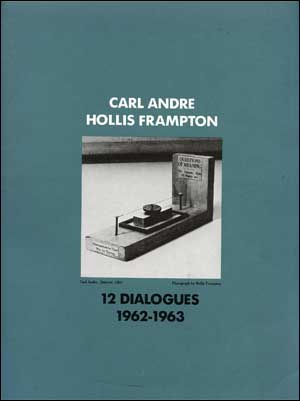Carl Andre, Hollis Frampton: 12 Dialogues, 1962–1963 (1980)
Filed under book | Tags: · aesthetics, art, art criticism, avant-garde, film, literature, music, painting, photography, sculpture

Twelve conversations between the minimalist sculptor Carl Andre and his close friend, photographer-filmmaker Hollis Frampton, about sculpture, photography, painting, music, literature, poetry and film. The two generated the dialogues over the course of a year, from October 1962 to September 1963 mostly on evenings and weekends in Andre’s one-room apartment in Brooklyn. A number of the dialogues begin with a discussion of recently shared art encounters, proceeding to examine a wide range of topics, including the development of avant-garde aesthetics, the significance of Duchamp, the legacy of the New York School, the relevance of photography, etc.
Edited and annotated by Benjamin H.D. Buchloh
Publisher The Press of the Nova Scotia College of Art and Design and New York University Press, 1980
ISBN 0919616178, 9780919616172
134 pages
via x
PDF (first 93 of 134 pages, 24 MB)
Comment (0)Fionnghuala Sweeney, Kate Marsh (eds.): Afromodernisms: Paris, Harlem, Haiti and the Avant-garde (2013)
Filed under book | Tags: · aesthetics, africa, afromodernism, art, art history, avant-garde, black people, blackness, body, colonialism, dance, futurism, jazz, modernism, music, politics, racism, sexuality, surrealism

“This collection of ten essays makes a persuasive case for a black Atlantic literary renaissance and its impact on modernist studies. The chapters stretch and challenge current canonical configurations of modernism in two ways: by considering the centrality of black artists, writers and intellectuals as key actors and core presences in the development of a modernist avant-garde; and by interrogating ‘blackness’ as an aesthetic and political category at critical moments during the twentieth century. This is the first book-length publication to explore the term ‘Afromodernisms’ and the first study to address together the cognate fields of modernism and the black Atlantic.”
Publisher Edinburgh University Press, 2013
ISBN 074864640X, 9780748646401
264 pages
Review: Dominic Thomas (French Studies, 2013).
PDF (updated on 2020-6-9)
Comment (0)Eccentric Manifesto (1922/1992)
Filed under manifesto, pamphlet | Tags: · art, avant-garde, cinema, film, manifesto, theatre

“The ‘Depot of Eccentrics’ which on the 9th July 1922 published The Eccentric Manifesto–a pamphlet ‘the size of an ordinary letter’–proved an ephemeral collaboration. In the words of subsequent critics, ‘difference of opinion’, ‘stern criticism’ caused its dissolution soon after The Factory of Eccentric Actor’s first productions–a stage version of Gogol’s The Wedding (1922) and a Cocteau inspired piece in three acts, Foreign Trade on the Eiffel Tower (1923).
A great rarity, the manifesto itself does not seem to have been any more influential than the ‘depot’ which published it. Containing four articles–by Leonid Trauberg, Grigori Kozintsev, Sergei Yutkevich and professional gambler Georgii Kryzhitskii–its post-civil war Petrograd print issue was limited to 1000 copies. Of these ‘a majority’ were entrusted by Yutkevich to Pravda critic Khrisanf Khersonsky to spread around Moscow ‘using his contacts’. Sales went badly however and the whole stock was dumped in Khersonsky’s basement where, when the house caught fire, it was ‘completely destroyed.’
[…] Kozintsev and Trauberg later made the film New Babylon (1929), subtitled “Assault on the Heavens–episodes from the Franco Prussian War and the Paris Commune 1870-71”, based less on Karl Marx than on the history of the Paris Commune written by P.O. Lissagaray. [The screenings were accompanied with an ensemble playing a score by Dmitri Shostakovich]. … In later years Shostakovich was to claim that ‘my troubles on the political front began with New Babylon.'” (from the Introduction)
First published in Russian in St Petersburg, 1922
Translated and with an Introduction by Marek Pytel
Cover by Clifford Harper
Publisher Eccentric Press, London, 1992
22 pages
via Reality
Entry on Factory of Eccentricity in Saint Petersburg Encyclopedia (in English)
PDF (lo-res), GIF images
Title page of Russian edition

